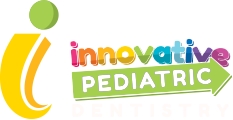Q: What happens at my child’s dental exam?
A: During your child’s dental exam, we’ll review their health history and take any necessary x-rays. The dentist will conduct a thorough examination of their mouth, including their teeth, gums, palate and tongue.
Then, if your child has enough teeth, the dental assistant will clean their teeth and give them a sparkling smile! We’ll also talk to your child about making good food choices and teach them how to brush and floss correctly.
Q: When should I start cleaning my baby’s teeth?
A: We recommend starting right away before your child even has any teeth. After feedings, use a wet wash cloth or gauze pad to wipe down their gums. Once their first tooth erupts, you can brush twice a day with a soft toothbrush designed for infants. As soon as any two teeth are touching, you’ll want to floss once daily.
Q: When should we use fluoride toothpaste and how much should we use?
A: When your child’s first tooth erupts and you start brushing, you can use a tiny smear of fluoride toothpaste. Then, increase it to a pea-sized amount from three- to six-years-old. Be sure to monitor them even when they’re brushing on their own to make sure they spit out the toothpaste.
Q: My child needs a bottle to sleep at night. What can I do?
A: Giving your baby a bottle of milk or juice in their crib can actually cause tooth decay. If your little one has to take a bottle at bedtime, it should only contain water. However, if it has already become a habit and they won’t sleep without the bottle, we know it can be hard to break and, hey, you need your sleep too! If this is the case, gradually dilute the milk or juice with water over a period of two to three weeks until your baby gets used to having just water at bedtime.
After your child’s nighttime feeding – including after breastfeeding – brush or wipe their gums and teeth with a damp washcloth or gauze pad to remove plaque. Try to do this while sitting down. Either place your child’s head in your lap or lay your child on the floor or changing table. Whatever position you choose, be sure you can see into your child’s mouth to effectively clean those teeth and gums.
Q: When will my child lose their baby (primary) teeth?
A: While it varies from child to child, most kids start to lose their baby teeth around age six. The process takes years and sometimes, they can even have some of those primary teeth until they’re a teenager! Check out this easy-to-follow eruption chart that shows the approximate ages for tooth eruption and replacement.
Q: Why are baby teeth important if they’ll just fall out and be replaced?
A: While, of course, the primary teeth will eventually make an exit, it’s best to let it happen naturally and it’s vital to maintain the health of these teeth. Aside from being adorable, baby teeth serve a number of important functions. Neglected primary teeth often cause problems that affect developing permanent teeth, creating a lifetime of dental issues. They’re essential for proper chewing and speech development. Additionally, they save space for the permanent teeth and encourage normal development of the surrounding muscles and jaw. Having unhealthy teeth can lower a child’s confidence and lead to poor self-esteem, which may prevent a little one from reaching their full potential.
Q: Why should kids go to a pediatric dental practice instead of a regular one?
A: At Innovative Pediatric Dentistry, we’re a little like a pediatrician’s office but for smiles. We’re trained in the oral health needs of children and know how to communicate with them to make them feel safe and comfortable. Our dentists have the education and expertise to work with kids of all ages, including those with special needs.
Our offices are designed just for children with child-themed rooms, toys, games, our kidzFlix cinema, comfort buddies and more. By making visits to the dentist fun, kids will be more likely to seek out dental care and keep up with their regular preventative appointments as adults. Here’s an even more detailed comparison of a pediatric dentist vs. general dentist.
Q: Are dental x-rays safe for my child?
A: Absolutely! We use modern technology in our offices, as well as strict safeguards. The amount of radiation received during a dental x-ray is extremely small. In fact, a child would be exposed to more radiation on an airplane flight across the country!
We use digital x-rays, which emit significantly less radiation than conventional x-rays. We also protect and shield children with lead body aprons. With our high-definition, cutting-edge imaging systems, we reduce the need for retakes and we can filter out unnecessary x-rays. Remember, dental x-rays represent a far smaller risk than an undetected and untreated dental problem!

